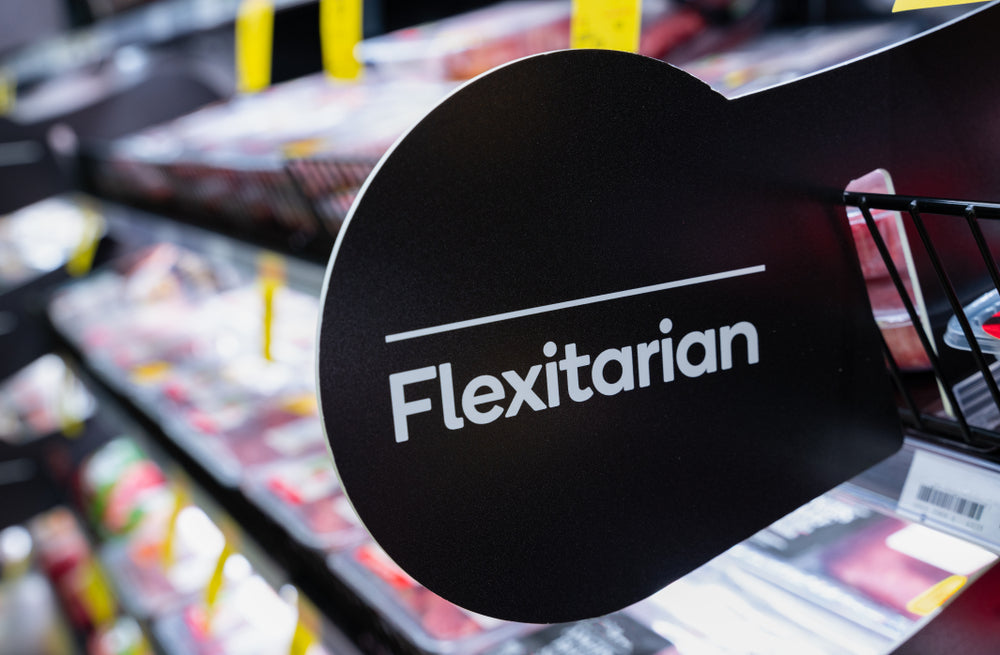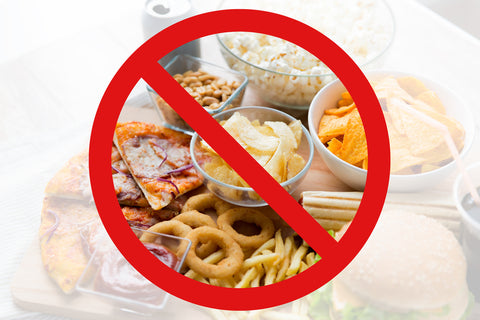Your cart is empty
Free shipping on all US orders


Free shipping on all orders

To flex or not to flex? That is the question. In case we lost you there, we’re talking about the flexitarian diet, something that most people have never even heard of. What is the flexitarian diet, you ask? How about we take a dive into what this extremely flexible lifestyle entails.
The flexitarian diet came into focus in 2008, when it was created by dietitian Dawn Jackson Blatner as a way for people to enjoy the benefits of a vegetarian lifestyle, while still being allowed to consume animal products in limited amounts.
If you think about it, this way of living is not something that was invented in 2008, as people have been doing this exact same thing for decades, if not longer. The word flexitarian was merely coined by Blatner at that time to mean flexible vegetarian. Pescatarians, or pesco vegetarian and ovo-vegetarians are essentially vegetarian based models that consume fish and seafood products, or eggs respectively – indicating that the flexitarian model has actually been in existence long before the trendy name came into being.

With that said, there are certain “rules" that should be adhered to in the flexitarian lifestyle. These aren’t all reasonable at all – in fact, they are an excellent guide that many order diet styles should seek to emulate.
Thou Shalt (You Get The Idea!) Make Fruits, Vegetables And Whole Grains The Base Of The Diet-This principle remains the same as the core of the vegetarian diet.
Primarily Consuming Plant-Based Protein Sources-Soy products and beans are still the primary sources of protein on the flexitarian diet
Total Amount Of Artificial Sweets And Sugar Laden Foods Should Be Minimized
Consuming Food In Its Most Unprocessed Form-It is believed that the closer to nature food is consumed, the greater the amount of nutrients retained.
Consume Meat And Animal-Based Products Occasionally, As The Need Arises
No Calorie Counting Necessary-Consumption of a primarily plant-based diet generally has the advantage of a lower caloric yield since fiber content is greater, and in turn satiety.
Compared to the standard American diet, a flexitarian lifestyle is advantageous for several reasons. However, since there are no hard and fast rules of what the diet entails, in terms of specific requirements, a direct comparison to other diets is difficult.
By far, the largest amount of benefits are associated not with increased consumption of plant-based foods, but rather restriction of the abundance of processed foods.
That is to say, a semi-vegetarian or vegetarian who restricts animal-based food consumption but still uses a lot of processed foods will not be in superior health to someone who eats meat products in limited quantities.
The most notable associated benefits include:
Cardiovascular risk is elevated owing to several factors, including age, genetics, lifestyle factors such as activity level, recreational drug use, and of course, diets. It is particularly higher in people that consume processed foods and fewer plant based ones, and people who consume less fiber in general.
The flexitarian diets will supply the average person with much more antioxidant rich foods, along with soluble and insoluble fiber to decrease inflammation, cholesterol and even blood pressure(1).
Someone who adheres to decent flexitarian principles will benefit in much of the ways that the full vegetarian would, such as reducing heart disease risk by over an average of 30%.
The development of type II diabetes is often the result of years of bad eating and lifestyle habits. While it can affect anyone, including people that adhere to a vegetarian lifestyle, one of the major deciding factors has to be consumption of large amounts of processed foods.
A flexitarian diet consisting of a high amount of plant-based foods will not only help to improve insulin sensitivity, but will also improve blood glucose control thanks to an abundance of dietary fiber.
Dietary fiber can help to balance blood sugar levels in the sense that its absorption from the G.I. tract is slowed to a more consistent rate. This is one of the primary reasons why diabetics are often advised to increase their fiber intake.
The data comparing vegetarians to nonvegetarians relative risk of type II diabetes is not significant(2), but what can’t be argued with is a definite improvement of health status when combined with other positive variables.
One of the most noticeable benefits of the flexitarian diet has to be its ability to help promote weight loss. There are actually several reasons for this. For instance, a reduction in the consumption of processed foods means that you are very likely to be consuming fewer daily calories(3).
Then there’s the fact that the higher fiber content of the diet has a blunting effect on appetite which makes one desire to eat less. Of course, in order for weight loss to be successful, a healthy diet must be maintained.
This is exactly why this diet lifestyle is suited for athletes as it can address problems with hunger which usually results in dietary failure.
While there is no way to absolutely make your risk zero, an effective way to reduce your relative risk is via the consumption of an array of colored fruits and vegetables. The many antioxidant and anti-inflammatory compounds found in plant-based foods help to reduce the damage reactive oxygen species can cause on cells, or even to DNA itself which may initiate cancerous changes.
Many people struggle to meet their daily recommendation of fruits and vegetables, so taking a step towards a more plant-based diet is an excellent decision to support your overall health and longevity.
Did you know that the agriculture, but specifically meat industry accounts for the lion’s share of all freshwater used around the world? Not surprisingly, it was calculated that a single hamburger patty requires several hundreds of gallons of water throughout the cow's lifecycle before ultimately ending up on your plate.
This is why any attempt to actively reduce the overall amount of animal-based food consumed will have a positive impact on the environment.
In addition to this, greenhouse gas emissions would be cut and the usage of grazing land would be reassigned for agricultural crops.
Proteins from plant sources are also far less energy intensive, requiring just about 10% of that necessary for animal-based foods to yield the same amount of net protein.
Meat is expensive, especially if you purchase quality cuts and organic products. Plant-based foods on the other hand, while still subject to premium prices, are generally much more affordable.

Flexitarian diets are useful in this regard since they can help you save money, especially if you think that you spend way too much on groceries.
The primary foods of the flexitarian diet are organic and loaded with many nutrients. For convenience, we have categorized the necessities by groups so you can easily pinpoint what you may be looking for.
Shoot for the following foods:
Since your consumption of animal-based products will be reasonably restricted, that means that dairy has been disqualified. Other suitable beverage options include:
Mayonnaise is off-limits except if it was made from olive oil, while other condiments such as mustard, olive oil based dressings, apple cider vinegar and salsa are all acceptable. Ketchup is only acceptable if there is no added sugar.
Legumes, lentils, tofu and soy beans form the primary protein sources on the flexitarian diet.
Even though the diet is an advocate for fruits, the fact of the matter is that many of them are very high in sugar content. This means that you need to restrain yourself from overindulging in them, or instead look for choices that are lower in sugar.
In general, there aren’t any particular restrictions on vegetables on this diet. In fact, vegetables should be the base of this diet and any other healthy diet. A wide range such as spinach, carrots, broccoli, squash, potatoes and more are great inclusions for this diet style.
Nuts and seeds provide an important source of healthy dietary fat for the flexitarian lifestyle, especially since there isn’t an abundance of meat being consumed. Almonds, Chia seeds, avocados, olives, and healthy grains such as quinoa are great additions to support this lifestyle.
There are no restrictions on the type of animal product that is permissible for consumption, but in general you do want to look for healthier choices. This means organic and free range meat and eggs, along with fresh fish. Milk and milk products should also only be used if the animals were grass-fed.
In general, the advantages of adapting to a flexitarian lifestyle far exceed the possible negatives, which is especially true if you make smart choices. However, it is still important for you to know what some of the possible negatives look like, and for the majority of people this relates to the development of nutritional deficiencies.
The good news is that supplements can help to address possible deficiencies which may occur including:
The best part about getting started on the flexitarian diet is that you can literally do it right now ( or at least at your next meal). That pack of chips you were about to reach for? Don’t. Go for a spoonful of natural peanut butter instead.
Likewise, if your next meal was pasta and meatballs, substitute the spaghetti with abundant leafy vegetables which require virtually no preparation to be edible.

If you feel intimidated by the thought of doing this for every meal, don’t. You don’t have to. In fact, what would a flexitarian diet be if it wasn’t flexible? If you are a complete beginner, then you should follow a beginners approach.
What do we mean by this? Here’s a quick and abbreviated explanation:
Total number of meals per week – 21
With this approach, the diet does not feel overly intimidating from the get-go. Instead, you can eventually transition to the next level when you believe you are comfortable with doing so.
The flexitarian diet is in some trend that will likely fade in a few years. Rather, it is THE dietary lifestyle we should all strive for, with a few modifications to support and help us reach our goals if athletically inclined.
There are definitely positive associations with consuming more plant-based foods, and the truth is that the majority of Americans need more on a daily basis. You can expect weight loss, improved energy levels, and the ultimate goal of better health. And you can make that change today.
(1)Yokoyama Y, Nishimura K, Barnard ND, et al. Vegetarian diets and blood pressure: a meta-analysis. JAMA Intern Med. 2014;174(4):577-587. doi:10.1001/jamainternmed.2013.14547
(2)Derbyshire EJ. Flexitarian Diets and Health: A Review of the Evidence-Based Literature. Front Nutr. 2017;3:55. Published 2017 Jan 6. doi:10.3389/fnut.2016.00055
(3)Tonstad S, Butler T, Yan R, Fraser GE. Type of vegetarian diet, body weight, and prevalence of type 2 diabetes. Diabetes Care. 2009;32(5):791-796. doi:10.2337/dc08-1886